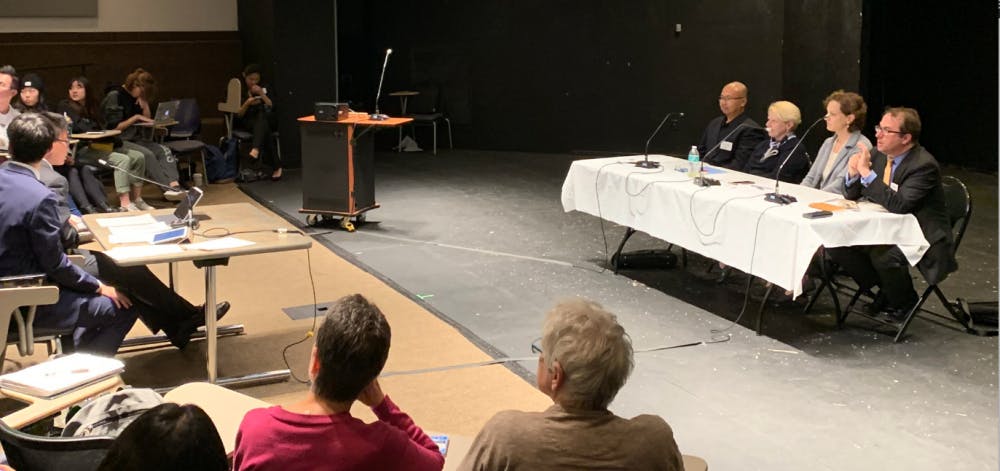A panel of University faculty members spoke about the Hong Kong protests in Arellano Theater on Wednesday. Speakers included: Anne Applebaum, a Washington Post columnist and senior fellow at the Stavros Niarchos Foundation (SNF) Agora Institute; Giovanna Dore, a lecturer in the East Asian Studies department; Ho-Fung Hung, a Sociology professor; and Andrew Mertha, the director of China Studies at the Hopkins School for Advanced International Studies. The panel was sponsored by the International Studies Leadership Council and the Hopkins chapter of Global China Connection.
One major theme for the speakers was the extraordinary nature of the Hong Kong protests.
Applebaum noted that the advent of facial recognition technology and other government tools required the protesters to adopt innovative methods of protesting.
“The question is whether you can even have a protest movement that can be successful or that can have any autonomy,” Applebaum said. “Everyone understands now that the idea that you can occupy a part of the city and sit there and wait for something to happen doesn’t work anymore in the 21st century.”
Mertha echoed Applebaum’s sentiment, and discussed other new methods that the Hong Kong protesters have used to advocate for change.
“Protests are a fascinating example of a new type of leaderless movement that demonstrated that social media could indeed be used for good, which was one of the initial expectations during the Arab Spring. It is also extraordinarily innovative,” Mertha said. “Hong Kong protesters have a degree of savvy sophistication, whether it’s political, media-based or understanding the context in which the protests are unfolding.”
The emphasis on protesters’ abilities to employ social media and technology resonated with a lot of attendees, such as freshman Sophie Liu, who highlighted this as one of the most engaging parts of the event.
“What was really interesting is how these protests in Hong Kong revolutionized the idea of what it means to advocate and protest an issue, especially because they don’t have an official leader,“ Liu said. “It’s more led by social media, and they are using tech to fuel these movements, and I found that really fascinating.”
The panelists also covered the American response to the protests and the pro-Hong Kong protest legislation that the House of Representatives recently passed.
Mertha was particularly critical of the limited U.S. response to the protests.
“The Trump administration essentially refrained from engaging, while Congress, in my view, used its power as a way to bludgeon Beijing and not necessarily help the people of Hong Kong find the soft landing that they need,“ Mertha said.
Panelists also considered other effects of the protests. Dore described the severe economic consequences that the protests have had on Hong Kong and consequently around the world.
“Retail has been decreasing something like 12 to 15 percent since July,“ she said. “The stock exchange market has also been going down in terms of volume traded. Tourism has been significantly damaged.”
Applebaum highlighted the potentially inspirational, global impact of the protests.
“How it unfolds and how it ends is being watched by people in Russia, people in Europe, frankly, people in many different parts of the globe in order to understand whether these kind of street protests can succeed under different positions,“ Applebaum said.
Hopkins students who attended the event felt that the perspectives the panelists shared were engaging.
Senior Alex Borovoy stated that the event was insightful and opened up discourse between people from mainland China, people from Hong Kong and Americans. He noted that although the panel was not ideologically balanced, he believed there were external factors that influenced this.
“This is such a black-and-white issue where, realistically speaking at least, it is very hard, in the context of [the United States], to paint the Hong Kong protesters as a bad thing,“ Borovoy said. “In terms of being successful in presenting both sides of the story, that’s kind of impossible.”
Freshman Yi Wu expressed some lingering confusion after the event. She stated that while the event offered general information about the protests, she was disappointed that the panelists did not discuss how to resolve the conflict.
“When I watched the Hong Kong protests on YouTube, I found a lot of media saying that it has been the protesters who have been violent. When I came here, a lot of professors said that it was the police who were extremely violent,” she said. “The professors provided general information about the protests, but they didn’t really talk about how to solve this issue.”





